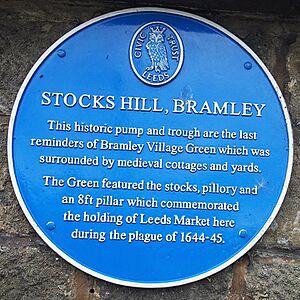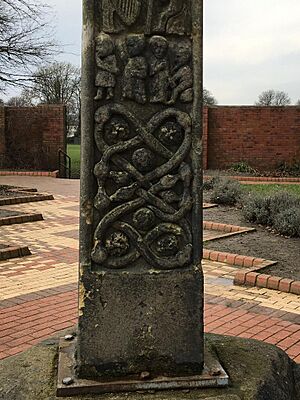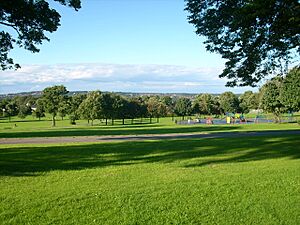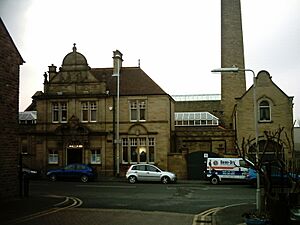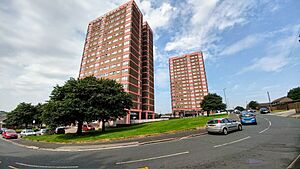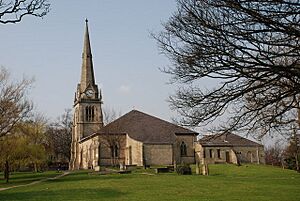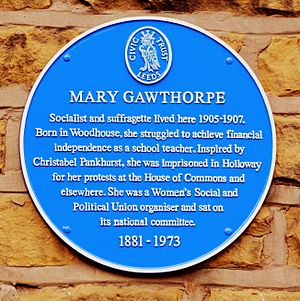Bramley, Leeds facts for kids
Quick facts for kids Bramley |
|
|---|---|
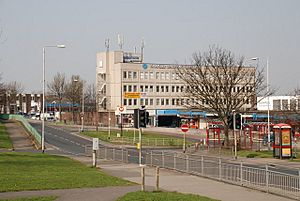 Bramley Shopping Centre and bus station |
|
| Population | 21,681 |
| OS grid reference | SE241344 |
| • London | 170 mi (270 km) SSE |
| Metropolitan borough | |
| Metropolitan county | |
| Region | |
| Country | England |
| Sovereign state | United Kingdom |
| Post town | LEEDS |
| Postcode district | LS13 |
| Dialling code | 0113 |
| Police | West Yorkshire |
| Fire | West Yorkshire |
| Ambulance | Yorkshire |
| EU Parliament | Yorkshire and the Humber |
| UK Parliament |
|
Bramley is a busy area in west Leeds, West Yorkshire, England. It is part of the City of Leeds. In 2011, about 21,334 people lived here. Bramley is an old industrial area. You can see many buildings from the 1800s. There are also homes built by the council in the east and private houses in the west.
Contents
What's in a Name?
The name Bramley first appeared in a very old book called the Domesday Book in 1086. It was written as Brameleia or Bramelei.
The name comes from two old English words: brōm (meaning 'broom', a type of plant) and lēah (meaning 'open land in a wood'). So, Bramley once meant 'open land with lots of broom plants'.
A Look Back in Time
Long ago, around the time of the Domesday survey, Bramley likely started at a place called Stocks Hill. It then grew along what is now Town Street.
You can still see a very old water pump and a stone water trough at Stocks Hill. These are reminders of Bramley's medieval past. A special blue plaque there tells us that this pump and trough are the last signs of Bramley Village Green. This green was once surrounded by old cottages. It also had stocks and a pillory, which were used to punish people long ago. The plaque also says that Leeds Market was held here in 1644-45 because of the plague.
In the 1800s, Bramley grew a lot because of new industries. The woollen textile industry became very important early in the century. Later, boot making and engineering also brought many jobs and people to the area.
Benjamin Wilson was the first person to write a history of Bramley in 1860. He gave his collection to Leeds City Museum. This included a "witch's bottle" found in Bramley in 1861.
In 1873, two people named John Gott and H. M. Gott put up a stone cross. It has carvings in the style of the Anglo-Saxons. This cross was put up to celebrate their eight years of living and working in Bramley. Today, it stands in a walled garden. Nearby, on Town Street, there is an old house that dates back to 1480.
Mary Gawthorpe, a famous teacher and activist, lived and worked at Hough Lane School in Bramley from 1905 to 1907. She wrote that Bramley was a "peaceful place" with homes and open fields. She said her walk to school felt "almost rural".
In the 1960s and 1970s, much of Bramley was rebuilt. The Bramley Shopping Centre replaced the old town centre. It was Leeds' second purpose-built shopping centre. The old shops and houses were very old and needed repairs. From 2008, the shopping centre got new stores like Farmfoods and Tesco. This helped to improve the area.
Today, parts of historic Bramley are protected. This is called the Bramley Town Conservation Area. It helps to keep the area around Bramley Park and Hough Lane special.
Community Life
Bramley is part of the Leeds West and Pudsey area for Parliament. The local Member of Parliament (MP) is Rachel Reeves.
Bramley has nice parks and open spaces for outdoor fun. Bramley Falls Wood runs next to the Leeds and Liverpool Canal. Bramley Park has an underground water tank at its highest point. Most years, Bramley Park hosts a fireworks display and the Bramley Carnival.
The Bramley Baths are a great example of Edwardian swimming baths. They were built in 1904 and have been restored. They have a 25-yard pool, a gymnasium, and a Russian steam room. In the early days, the pool could be covered with a dance floor for dances! These baths are the only Edwardian era bath-house left in Leeds. They are a Grade II listed building, which means they are very important historically. The baths were built where an iron factory used to be. The factory's chimney, made from over 8,000 bricks, still stands tall over the baths. You can see it from far away in Leeds. The four houses next to the baths were built around 1803. They were the homes of the iron factory owner and his three children.
Bramley Shopping Centre is a shopping area built in the 1960s. It has many different shops, including charity shops, banks, bakeries, supermarkets, and a post office. You can also find places like Greggs, Pizza Hut Delivery, and fast food takeaways.
Some areas in Bramley have groups called residents' associations. These include Moorside and Ganners, Landseer, Rossefield, and Newlay and Whitecote. There is also LILAC, which is a project for affordable and eco-friendly housing.
Bramley has many churches. These include churches for Baptists, Roman Catholics, Jehovah's Witnesses, and Methodists. There are also two Anglican churches: St. Peter's (shown in the picture) and St. Margaret's.
Getting Around
Bramley railway station is just off Stanningley Road. It is on the Leeds-Bradford Line, between Leeds station and New Pudsey.
Bramley bus station is in the middle of Bramley, within the shopping centre.
Sports in Bramley
Rugby League
Bramley RLFC was a rugby league club started in 1879. They played at Barley Mow and later at McLaren Field. They joined the Northern Union in 1896. The club stopped playing in 1999.
After Bramley RLFC closed, a new club called Bramley Buffaloes started in 2000. They play in the Yorkshire Mens League.
Rugby Union
Bramley Phoenix RUFC is a rugby union club formed in 1921. They play their home games at Warrels Mount. They are part of the Yorkshire Counties leagues.
Football
Bramley Juniors Football Club started in 1994. It began with one team for under-9s and now has teams for all ages.
Famous People from Bramley
- Mary Gawthorpe: She was a suffragette, which means she fought for women's right to vote. She was also a socialist, a trade unionist, and an editor. She lived and worked in Bramley as a school teacher.
- Ernie Wise: He was a famous comedian, part of the duo Morecambe and Wise. He was born in Bramley.
- Major John Geoffrey Appleyard: A brave soldier and war hero from the Commandos and SAS. He was born in Bramley in 1916.
- Jamie Peacock: A very successful professional rugby league player. He played for the Leeds Rhinos and Bradford Bulls. He also captained the Great Britain and England teams. He was born in Bramley in 1977.
 | James B. Knighten |
 | Azellia White |
 | Willa Brown |



